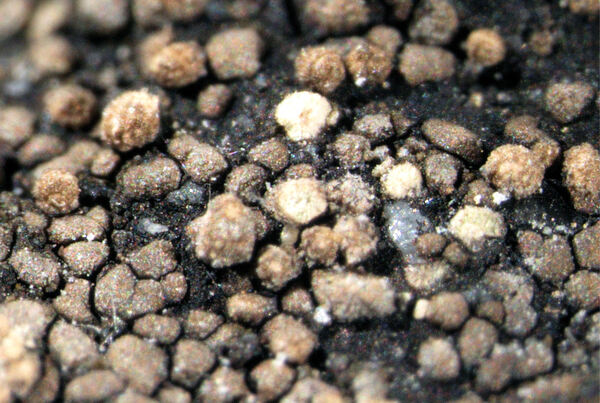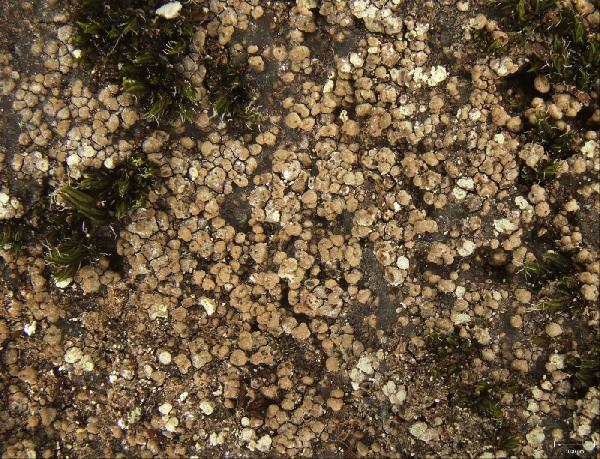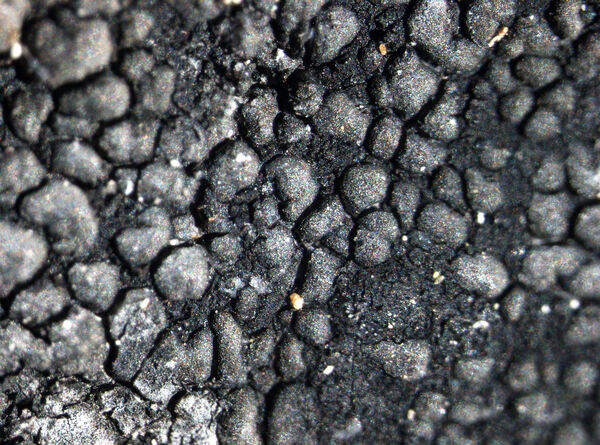Rimularia gibbosa (Ach.) Coppins, Hertel & Rambold
in Hertel & Rambold, Bibl. Lichenol., 38: 171, 1990. Basionym: Pyrenula gibbosa Ach. - Lichenogr. Univ.: 317, 1810.
Synonyms: Aspicilia bockii (T. Rödig) Boistel; Lecanora bockii T. Rödig; Lecanora grimselana A. Massal.; Mosigia gibbosa (Ach.) Körb.
Description: Thallus crustose, episubstratic, 0.1-0.4 mm thick, of scattered to contiguous areoles developing on a black hypothallus, forming up to 6 cm wide patches. Areoles rounded to irregularly angular, pale grey-brown to beige, slightly to strongly convex or almost bullate, 0.4-0.5(-0.7) mm wide, each one bearing a 0.15-0.25 mm wide and up to 0.5 mm tall, papillose-isidioid outgrowth giving rise to a whitish, 0.2-0.5 mm wide soralium. Medulla white, I-. Apothecia sparse, lecanorine, 0.5-0.8(-1.2) mm across, often umbonate or gyrodisc, with an initially punctiform, then expanded, black, slightly convex disc and a 0.1-0.3 mm thick, persistent thalline margin. Proper exciple dark brown in outer part, pale brown to colourless within, continuous with hypothecium; epithecium pale brown; hymenium colourless, but subdivided into portions by vertical, dark brown bundles of sterile hyphae, 90-110 μm high; paraphyses coherent, slender, richly branched and anastomosing; hypothecium dark brown, up to 350 μm high. Asci 8-spored, broadly clavate, the tholus with amyloid flanks and an amyloid cap with vestiges of a narrow, weakly amyloid channel in the upper, central part, Rimularia-type. Ascospores 1-celled, hyaline but soon turning brown, ellipsoid, (14-)16-25(-30) x (8-)10-13(-14) μm. Pycnidia black, immersed. Conidia short-bacilliform. Photobiont chlorococcoid. Spot tests: thallus (especially medulla) K-, C+ pink, KC+ pink, P-, UV-. Chemistry: gyrophoric acid.
Growth form: Crustose
Substrata: rocks
Photobiont: green algae other than Trentepohlia
Commonnes-rarity: (info)
Alpine belt: extremely rare
Subalpine belt: very rare
Montane belt: extremely rare
Dry submediterranean belt: absent
Humid submediterranean belt: absent
Padanian area: absent
pH of the substrata:
1 2 3 4 5
Solar irradiation:
1 2 3 4 5
Aridity:
1 2 3 4 5
Eutrophication:
1 2 3 4 5
Poleotolerance:
0 1 2 3
Altitudinal distribution:
1 2 3 4 5 6
Rarity
absent
extremely rare
very rare
rare
rather rare
rather common
common
very common
extremely common
Loading data...
Occurrence data
Predictive map
Growth form: Crustose
Substrata: rocks
Photobiont: green algae other than Trentepohlia
Commonnes-rarity: (info)
Alpine belt: extremely rare
Subalpine belt: very rare
Montane belt: extremely rare
Dry submediterranean belt: absent
Humid submediterranean belt: absent
Padanian area: absent
pH of the substrata:
| 1 | 2 | 3 | 4 | 5 |
Solar irradiation:
| 1 | 2 | 3 | 4 | 5 |
Aridity:
| 1 | 2 | 3 | 4 | 5 |
Eutrophication:
| 1 | 2 | 3 | 4 | 5 |
Poleotolerance:
| 0 | 1 | 2 | 3 |
Altitudinal distribution:
| 1 | 2 | 3 | 4 | 5 | 6 |
Rarity
absent
extremely rare
very rare
rare
rather rare
rather common
common
very common
extremely common
Loading data...
Occurrence data
Predictive map










